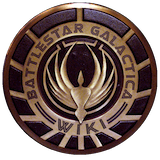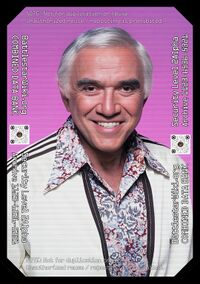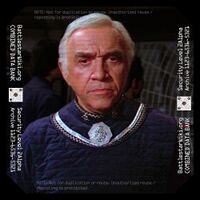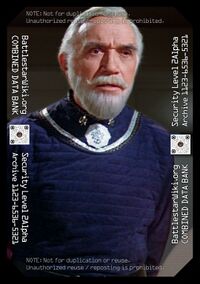Lorne Greene: Difference between revisions
More languages
More actions
m Added his middle name |
m + pics Tag: 2017 source edit |
||
| (46 intermediate revisions by 16 users not shown) | |||
| Line 1: | Line 1: | ||
Lorne | {{Cast Data/nestedtest | ||
| image = Promo - Lorne Greene.jpg | |||
| image2 = AdamaLL1.jpg | |||
| image3 = Adama80.jpg | |||
| character= [[Adama (TOS)|Commander Adama]] from ''[[Battlestar Galactica (TOS)|Battlestar Galactica]],''<br />[[Adama (1980)|Commander Adama]] from ''[[Galactica 1980]]'' | |||
| series=TOS | |||
| series 2=1980 | |||
| born_month= 02 | |||
| born_day= 12 | |||
| born_year= 1915 | |||
| death_month= 09 | |||
| death_day= 11 | |||
| death_year= 1987 | |||
| nationality= CA | |||
| imdb= 0001296 | |||
| sortkey=Greene, Lorne | |||
}} | |||
'''Lorne Hyman Greene'''<ref>{{cite_web|url=http://search.ancestrylibrary.com/cgi-bin/sse.dll?indiv=1&db=CAdeath1940&h=2844603&tid=&pid=&usePUB=true&_phsrc=wWD1&_phstart=successSource&usePUBJs=true&rhSource=60901|title=Ancestry.com: Lorne Hyman Greene per Social Security records|date=|accessdate=13 June 2019|last=|first=|format=|language=}}</ref>, [[w:Order of Canada|OC]] (born '''Lyon Himan Green'''<ref name="biobooklinda">{{cite book|last=Bennett|first=Linda Greene|title=My Father's Voice: The Biography of Lorne Greene|publisher=iUniverse, Inc.|date=November 1, 2004|edition=Paperback|page=254|isbn=978-0-595-33283-0}}</ref> ; February 12, 1915—September 11, 1987) was a Canadian actor best known for playing signature roles on the television shows ''Bonanza'' and the original ''[[Battlestar Galactica (TOS)|Battlestar Galactica]]''. | |||
==Early Life== | ==Early Life== | ||
== | Lorne Greene was born in [[wikipedia:Toronto|Toronto]], [[wikipedia: Ontario|Ontario]] [[wikipedia:Canada|Canada]] to immigrant parents. He was the second child born to Daniel and Dora Greene, though sadly his older brother died in infancy. He went to high school at Lisgar Collegiate Institute and while there was cast in the play ''Les Deux Sourds'' as one of the deaf characters that shouts throughout the play. | ||
The | |||
He attended Queen’s College in Kingston Ontario as a chemical engineering major, though his growing love for acting caused him to eventually change his major to free his time for drama projects. The college had no drama department, only a drama guild which Greene was highly active in. He graduated in 1937 and moved to [[wikipedia: New York City|New York City]] to continue honing his craft. | |||
=="The Voice of Canada"== | |||
After a short stint in the [[wikipedia:Royal Canadian Air Force|Royal Canadian Air Force]], Greene returned to Canada and, due to a lack of acting jobs, found a job as a radio announcer for the [[wikipedia:Canadian Broadcasting Corporation|Canadian Broadcasting Corporation]] (CBC), due to his deep, booming voice. He was notably the only Canadian to ever win NBC’s top radio broadcasting award. During World War II, he was given two nicknames: "The Voice of Canada" due to his popularity and recognizable voice, and also "The Voice of Doom," because of his voice and the bad news from the front that he delivered through the radio. | |||
Additionally, Greene is credited for the invention of the "backwards clock"—a stopwatch that ran backwards from 60 minutes to 0 minutes—that allowed him to know exactly how much time he had remaining, and so he would be able to end his radio broadcasts.<ref>{{cite book/sswa|57}}</ref> This invention lead to an invitation to demonstrate the device to a New York-based [[w:NBC|NBC]] executive, which later lead to a run-in with ''[[w:Studio One|Studio One]]'' producer [[w:Fletcher Markle|Fletcher Markle]] and work on the aforementioned show that lead to his next stage in his career.<ref>{{cite_news|first=|last=|url=https://www.latimes.com/archives/la-xpm-1987-09-12-me-1780-story.html|title=TV Role Lasted 14 Seasons, Made Him a Household Name : Lorne Greene, 72, 'Bonanza' Star, Dies | |||
|publisher=Los Angeles Times|page=|date=12 September 1987|accessdate=12 June 2019|language=}}</ref> | |||
==Television fame and ''Bonanza''== | |||
Greene moved back to New York in 1953 to continue his acting career, and landed several roles on Broadway before breaking into films with 1954’s [http://www.imdb.com/title/tt0047494/ ''The Silver Chalice'']. | |||
He appeared in movies and television shows throughout the 1950s. An appearance on the television show ''[[wikipedia:Wagon Train|Wagon Train]]'' caught the attention of the producer of a show called ''[[wikipedia: Bonanza|Bonanza]]''. His performance in ''Wagon Train'' and his subsequent performance as Big Brother in a CBS production of [http://www.imdb.com/title/tt0712166/ ''1984''] resulted in his being offered the part of Ben Cartwright, a part which became his most recognizable role. The show ran from 1959-1973. | |||
== ''Battlestar Galactica'' == | |||
After ''Bonanza'', Greene appeared in several television programs, most notably as Commander {{TOS|Adama}} in [[Battlestar Galactica (TOS)|the original ''Battlestar Galactica'']] and its short-lived spinoff series, ''[[Galactica 1980]]''. | |||
According to [[Glen A. Larson]], casting Greene in ''Galactica'' was something "everyone could agree on rather easily," after deciding that the show's core should be family based and that a "certain amount of warmth" was desired for the patriarchal role.<ref>{{cite book/sswa|56}}</ref> Greene agreed to the role, noting that his first reaction to the first science fiction story he'd ever work on was "wild," but then noting his concern that "how in heaven's name are they going to bring it off?"<ref>{{cite book/sswa|59}}</ref> | |||
Greene's patriarchal nature was both on- and off-celluloid, for the crew gravitated towards Greene to keep the actors "chill" during the chaotic, long hours of production. According to [[Herbert Jefferson Jr.]] ({{TOS|Boomer}}), "He was Poppa. I'm sure anyone who worked on the original show has a great admiration for Lorne Greene; he was sort of like an adopted uncle to you."<ref name="sswa60">{{cite book/sswa|60}}</ref> | |||
During production, Greene would have an on-going chess game with Jefferson, with a board set up on an [[w:apple box|apple box]] located on the set: "I'd make one move, and maybe sometime during the day he'd come by and make his move. And the crew knew you were never to touch that board. We would leave the board sitting there all night and we'd come back and all the pieces were there."<ref name="sswa60"/> | |||
Greene would also interact with the creatives and crew on the show, including writers. While filming "[[Fire In Space]]," Greene was introduced to story editors [[Jim Carlson]] and [[Terrence McDonnell]], to which Greene made a particular point: "You don't have to give me every line, but what I do has to be imporrrrrtant." (And it was this long dragged-out "impporrrrrtant.") Following this conversation, both Carlson and McDonnell would take steps to avoid Greene on set. This eventually did not work when Greene made himself welcome to their writing office and spoke at length for hours, which McDonnell recounted as particularly inconvenient due to the fact that they were under a severely truncated timeline to write "[[Murder on the Rising Star]]."<ref>{{cite book/sswa|58}}</ref> | |||
== Post-''Galactica'' == | |||
Following ''Galactica'', Greene reunited with [[Laurette Spang]] ([[Cassiopeia]]) for the first episode of [[w:Aaron Spelling|Aaron Spelling]]'s 1981 comedy series ''[[w:Aloha Paradise|Aloha Paradise]]''. Filmed in Hawaii, Greene portrayed Spang's father, while [[w:Jayne Meadows|Jayne Meadows]] portrayed her mother in a situation where parents make themselves interlopers in Spang's honeymoon in a comedic manner. As Spang recalls, "Lorne and I had great fun because he was so funny. It was a whole different side of him."<ref>{{cite book/sswa|61-62}}</ref> | |||
Greene became popular for his Alpo dog food commercials. Always an animal lover, he was vice chairman of the American Wild Horse Association and honorary chairman of the Wildlife Federation. He wrote a book titled [http://www.amazon.com/exec/obidos/ISBN=0671240129 ''The Lorne Greene Book of Remarkable Animals''] and was the host of a television show titled [http://www.imdb.com/title/tt0302147/ ''Lorne Greene’s New Wilderness'']. | |||
Greene | |||
He also was the host of the [[wikipedia:Macy's Thanksgiving Day Parade|Macy’s Thanksgiving Day Parade]] from 1963-1972. Additionally he helped create and promote [http://oghs.hanc.k12.wv.us/clubs/acadgame/Games/Propaganda.htm ''Propaganda''], a game that teaches players how to analyze the soundness of statements made by politicians and pitchmen of every stripe. | |||
In 1985 Greene was awarded a star on the [[wikipedia:Hollywood Walk of Fame|Hollywood Walk of Fame]]. | |||
==Death== | ==Death== | ||
Greene died in 1987 | Not long after taking part in a press conference to announce production of a TV pilot of ''Bonanza: The Next Generation'', in which he was to have appeared, Greene died in 1987 after a bout of pneumonia and was buried at Hillside Memorial Park in Culver City, California. He was survived by his wife, Nancy Deale, and three children: [[Gillian Greene|Gillian]], and twins Belinda and Charles. | ||
==External links== | |||
{{ext-wikipedia}} | |||
==References== | |||
{{reflist}} | |||
[[de: Lorne Greene]] | |||
[[fr:{{PAGENAME}}]] | |||
Latest revision as of 14:54, 13 October 2024
| |||||
| {{{credit}}} | |||||
| Portrays: | Commander Adama from Battlestar Galactica, Commander Adama from Galactica 1980 | ||||
| Date of Birth: | February 12, 1915 | ||||
| Date of Death: | September 11, 1987 | ||||
| Age at Death: | 72 | ||||
| Nationality: | |||||
| Related Media | |||||
|---|---|---|---|---|---|
| @ BW Media | |||||
[{{{site}}} Official Site]
| |||||
Lorne Hyman Greene[1], OC (born Lyon Himan Green[2] ; February 12, 1915—September 11, 1987) was a Canadian actor best known for playing signature roles on the television shows Bonanza and the original Battlestar Galactica.
Early Life
Lorne Greene was born in Toronto, Ontario Canada to immigrant parents. He was the second child born to Daniel and Dora Greene, though sadly his older brother died in infancy. He went to high school at Lisgar Collegiate Institute and while there was cast in the play Les Deux Sourds as one of the deaf characters that shouts throughout the play.
He attended Queen’s College in Kingston Ontario as a chemical engineering major, though his growing love for acting caused him to eventually change his major to free his time for drama projects. The college had no drama department, only a drama guild which Greene was highly active in. He graduated in 1937 and moved to New York City to continue honing his craft.
"The Voice of Canada"
After a short stint in the Royal Canadian Air Force, Greene returned to Canada and, due to a lack of acting jobs, found a job as a radio announcer for the Canadian Broadcasting Corporation (CBC), due to his deep, booming voice. He was notably the only Canadian to ever win NBC’s top radio broadcasting award. During World War II, he was given two nicknames: "The Voice of Canada" due to his popularity and recognizable voice, and also "The Voice of Doom," because of his voice and the bad news from the front that he delivered through the radio.
Additionally, Greene is credited for the invention of the "backwards clock"—a stopwatch that ran backwards from 60 minutes to 0 minutes—that allowed him to know exactly how much time he had remaining, and so he would be able to end his radio broadcasts.[3] This invention lead to an invitation to demonstrate the device to a New York-based NBC executive, which later lead to a run-in with Studio One producer Fletcher Markle and work on the aforementioned show that lead to his next stage in his career.[4]
Television fame and Bonanza
Greene moved back to New York in 1953 to continue his acting career, and landed several roles on Broadway before breaking into films with 1954’s The Silver Chalice.
He appeared in movies and television shows throughout the 1950s. An appearance on the television show Wagon Train caught the attention of the producer of a show called Bonanza. His performance in Wagon Train and his subsequent performance as Big Brother in a CBS production of 1984 resulted in his being offered the part of Ben Cartwright, a part which became his most recognizable role. The show ran from 1959-1973.
Battlestar Galactica
After Bonanza, Greene appeared in several television programs, most notably as Commander Adama in the original Battlestar Galactica and its short-lived spinoff series, Galactica 1980.
According to Glen A. Larson, casting Greene in Galactica was something "everyone could agree on rather easily," after deciding that the show's core should be family based and that a "certain amount of warmth" was desired for the patriarchal role.[5] Greene agreed to the role, noting that his first reaction to the first science fiction story he'd ever work on was "wild," but then noting his concern that "how in heaven's name are they going to bring it off?"[6]
Greene's patriarchal nature was both on- and off-celluloid, for the crew gravitated towards Greene to keep the actors "chill" during the chaotic, long hours of production. According to Herbert Jefferson Jr. (Boomer), "He was Poppa. I'm sure anyone who worked on the original show has a great admiration for Lorne Greene; he was sort of like an adopted uncle to you."[7]
During production, Greene would have an on-going chess game with Jefferson, with a board set up on an apple box located on the set: "I'd make one move, and maybe sometime during the day he'd come by and make his move. And the crew knew you were never to touch that board. We would leave the board sitting there all night and we'd come back and all the pieces were there."[7]
Greene would also interact with the creatives and crew on the show, including writers. While filming "Fire In Space," Greene was introduced to story editors Jim Carlson and Terrence McDonnell, to which Greene made a particular point: "You don't have to give me every line, but what I do has to be imporrrrrtant." (And it was this long dragged-out "impporrrrrtant.") Following this conversation, both Carlson and McDonnell would take steps to avoid Greene on set. This eventually did not work when Greene made himself welcome to their writing office and spoke at length for hours, which McDonnell recounted as particularly inconvenient due to the fact that they were under a severely truncated timeline to write "Murder on the Rising Star."[8]
Post-Galactica
Following Galactica, Greene reunited with Laurette Spang (Cassiopeia) for the first episode of Aaron Spelling's 1981 comedy series Aloha Paradise. Filmed in Hawaii, Greene portrayed Spang's father, while Jayne Meadows portrayed her mother in a situation where parents make themselves interlopers in Spang's honeymoon in a comedic manner. As Spang recalls, "Lorne and I had great fun because he was so funny. It was a whole different side of him."[9]
Greene became popular for his Alpo dog food commercials. Always an animal lover, he was vice chairman of the American Wild Horse Association and honorary chairman of the Wildlife Federation. He wrote a book titled The Lorne Greene Book of Remarkable Animals and was the host of a television show titled Lorne Greene’s New Wilderness.
He also was the host of the Macy’s Thanksgiving Day Parade from 1963-1972. Additionally he helped create and promote Propaganda, a game that teaches players how to analyze the soundness of statements made by politicians and pitchmen of every stripe.
In 1985 Greene was awarded a star on the Hollywood Walk of Fame.
Death
Not long after taking part in a press conference to announce production of a TV pilot of Bonanza: The Next Generation, in which he was to have appeared, Greene died in 1987 after a bout of pneumonia and was buried at Hillside Memorial Park in Culver City, California. He was survived by his wife, Nancy Deale, and three children: Gillian, and twins Belinda and Charles.
External links
- Lorne Greene article at Wikipedia, the free encyclopedia.
References
- ↑ Ancestry.com: Lorne Hyman Greene per Social Security records (backup available on Archive.org) (in ). Retrieved on 13 June 2019.
- ↑ Bennett, Linda Greene (November 1, 2004). My Father's Voice: The Biography of Lorne Greene, Paperback, iUniverse, Inc..
- ↑ Altman, Mark A.; Gross, Edward (2018). So Say We All: The Complete, Uncensored, Unauthorized Oral History of Battlestar Galactica. Tor Books. ISBN 9781250128942, p. 57.
- ↑ "TV Role Lasted 14 Seasons, Made Him a Household Name : Lorne Greene, 72, 'Bonanza' Star, Dies", Los Angeles Times, 12 September 1987. Retrieved on 12 June 2019.
- ↑ Altman, Mark A.; Gross, Edward (2018). So Say We All: The Complete, Uncensored, Unauthorized Oral History of Battlestar Galactica. Tor Books. ISBN 9781250128942, p. 56.
- ↑ Altman, Mark A.; Gross, Edward (2018). So Say We All: The Complete, Uncensored, Unauthorized Oral History of Battlestar Galactica. Tor Books. ISBN 9781250128942, p. 59.
- ↑ 7.0 7.1 Altman, Mark A.; Gross, Edward (2018). So Say We All: The Complete, Uncensored, Unauthorized Oral History of Battlestar Galactica. Tor Books. ISBN 9781250128942, p. 60.
- ↑ Altman, Mark A.; Gross, Edward (2018). So Say We All: The Complete, Uncensored, Unauthorized Oral History of Battlestar Galactica. Tor Books. ISBN 9781250128942, p. 58.
- ↑ Altman, Mark A.; Gross, Edward (2018). So Say We All: The Complete, Uncensored, Unauthorized Oral History of Battlestar Galactica. Tor Books. ISBN 9781250128942, p. 61-62.



